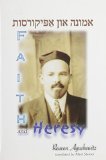

 |

|

The average rating for Faith and Heresy based on 2 reviews is 4 stars.
Review # 1 was written on 2013-03-11 00:00:00 Randall Lum Randall LumInteresting reading, though much was from the 1990s and early 2000s. I was unpleasantly surprised to learn that some scholars had discounted Shoah/Holocaust writing and rituals dating before the Six Day War, but I was equally glad to hear that there actually *was* a good deal written about the Shoah in the immediate aftermath thereof, reports to the contrary notwithstanding. "The Paradoxes of American Jewish Culture," by Stephen J. Whitfield, is an essay "originally presented on April 6, 1992" (at U. of Michigan, Ann Arbor), so it's one of the older chapters in this book. That said, I enjoyed the manner in which the writer played with language. Here are a couple of samples: "The son of a Communist mother and a poet father, [Allen] Ginsberg has been the quondam bard of a lyrical Jewish leftism who opened himself to the charge of selling his birthright for a message about pot . . ." [Page 250] Regarding "help[ing] form the mass [American] culture around which a disparate people [i.e., of myriad ethnic and linguistic origins] could cohere, Whitfield write, "Amid the flux that [Alexis de] Tocqueville had emphasized, the option of consent could displace the category of descent, giving even erstwhile pariahs so many chances to hit the jackpot that the cherries, grapes, and lemons all seemed to come up at once." [Page 253] Also noteworthy from Whitfield's chapter: " . . . traditional Judaism . . . is so exacting in its authority, so interdictory in its texture, Louis Finkelstein once remarked, that "it demands of its people what other religions demand of those in religious orders. Because Judaism demands so much, it never gets 100%." [Page 254] |
Review # 2 was written on 2014-03-16 00:00:00 Mike Richardson Mike RichardsonWhen I pulled this book from the boxed set, I inadvertently broke the sequencing scheme I had for reading this series. I'd intended to read them in order from "most exotic" to "least exotic," landing last on Roman Catholicism, the religion I was raised in. That would have placed this one *after* Islam, which is instead the one I'll be reading next. As expected, I found this one to be the most accessible so far, because of the clear line of descent between Judaism and Christianity. I found it interesting that some features of my birth religion, such as "Catholic guilt," actually arise in Judaism and are simply transmitted through that descent. It probably also helped that the author is a genuine evangelist for his religion, and speaks of it as if it were Truth, and the reader a (potential) believer. This makes many concepts much less abstract. The book is organized in a way that I found somewhat more rational than the previous volumes, but this may simply be a consequence of the cultural affinities between religions. Each section is amply supported by writings from rabbis of cultural and historical significance. These writings can help put some things in perspective that might be challenging even given that cultural affinity, such as modern Zionism and the warlike nature of early Jewish society. (I generally prefer an anthropological / archaeological view over a religious one when seeking rationale for such things, but it doesn't hurt to have multiple perspectives casting light on the subject.) Perhaps inadvertently, the author seems to undermine one aspect of his case with a couple of the readings, which apparently contradict each other. (On the other hand, this may be his attempt to illustrate the inherent mysteries of faith, and human inability to grasp cosmic subtleties.) We're told in the chapter on Doctrine that human nature is very akin to godlike nature, and that sin alienates humanity from his true nature, thereby imposing its own punishment in process. A few pages later, however, a reading makes the point that it's all too easy to fall into sin, and that as we age, this tendency becomes greater. This suggests to me that human nature is less godlike than sinful, and I'm not entirely sure the author was aware that the near-juxtaposition of these arguments would come across as contradictory. Maybe, though, it was intentional, with the objective of pointing out that of such (apparent) contradictions faith is made. I could, and should, have finished this book a couple weeks before I did. Having had a couple loaner books dropped in my lap about two-thirds of the way through, I took a break from this to work on those in order to return them as quickly as possible. Don't let my excessively-long read time dissuade you from this book, if you've an interest in religion. Not counting the References section, it's only 246 pages, and comparatively breezy. |
CAN'T FIND WHAT YOU'RE LOOKING FOR? CLICK HERE!!!